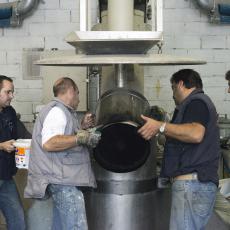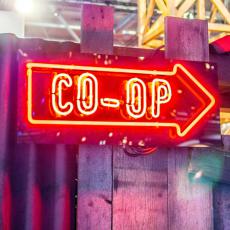How Workers Laid Off from a Chicago Factory Took It Over Themselves
When their boss tried to fire them, the workers of Republic Windows and Doors occupied the factory. Now they own it as a cooperative.
Four years ago, as the recession took hold and layoffs around the country were approaching 500,000 a month, a group of workers in Chicago saved a factory and inspired a nation. Fired by their boss, they occupied instead of leaving. Fired by a second boss, they occupied and formed a worker’s cooperative. Now they are worker-owners of a load of equipment and they’re setting up a factory in a new location.
All they want to do is to get back to making and selling windows. It shouldn’t be this hard to keep good jobs in Chicago, but “A cooperative can be a way of surviving, of moving forward,” says Armando Robles, one of the workers.
Robles was one of 250 workers fired in December 2008 without notice or severance by Republic Windows and Doors when the company announced it was closing its Chicago factory. The company said that it could no longer operate because it had lost its line of credit with Bank of America. The irony of the situation was clear. Bank of America had received billions in government bailouts to keep the economy working, and yet the Republic workers were being laid off without their entitled payments and benefits. Supported by their union, the United Electrical, Radio and Machine Workers of America, Robles and his fellow workers voted to resist. They occupied the plant for six days, winning back pay, severance, and time for a new company to take ownership. Generating thousands of articles and news reports about their fight, they encouraged a downcast nation, even an incoming U.S. president.
At a press conference during the factory occupation, then President-elect Barack Obama declared: “When it comes to the situation here in Chicago, with the workers who are asking for their benefits and payments they have earned … I think they are absolutely right.”
The public relations potential, combined with the prospect of stimulus spending and a green economy boom, spurred Serious Energy of California to take over the former Republic plant in February 2009. Among the investors in the new business was Mesirow Financial, a Chicago-based firm, with close ties to (among others), then White House Chief of Staff (soon to be Chicago Mayor) Rahm Emanuel. With $15 million from Mesirow alone, Serious looked forward to landing substantial federal and city contracts.
Two years later, those contracts were yet to materialize. The ballyhooed green economy? Chicago’s grand green retrofitting scheme? They were nowhere in sight, and city and state spending was essentially on ice. By the end of 2009, only 20 of the Republic workers had been hired back. In February 2012, Serious announced it, too, was closing the Chicago factory and selling off the machines.
This time, Robles et al. only needed to occupy for a matter of hours before management agreed to a deal. Serious agreed to give the workers the first option to buy the plant’s equipment and 90 days to come up with a bid.
“Republic walked away from our jobs. Serious walked away from our jobs, but we are not walking away from our jobs,” said Melvin Macklin, who had worked at the plant for more than a decade. In the time between the first layoff and the second, the workers and their families became aware of other options. As it happens, after appearing together with Naomi Klein and Avi Lewis on GRITtv, Robles and United Electrical field organizer Leah Fried sat down with The Working World, a nonprofit that has helped start and maintain worker cooperatives in Argentina and other parts of Latin America.
With help from The Working World and advice from colleagues in the co-op movement in the United States and abroad, on May 30, 2012, Robles, Macklin and 22 colleagues founded New Era Windows, LLC, a worker-run cooperative incorporated in Illinois to manufacture what they promise will be “quality, affordable windows.”
Despite the initial agreement, it was not until last August, many months and some intense struggle later, that Serious finally agreed to let New Era buy the factory equipment. The struggle was partly political—Serious had to be pressured to keep its pledge to the workers—but it was largely financial. The new worker-owners decided that they would earn equal wages and have equal votes in decision-making. They also agreed to each contribute a fee of $1,000 to “buy in.” At 58, Macklin borrowed some of his buy-in from a nephew, but he says that the stretch to raise the money was worth it.
“It’s not just about profits,” he says—it’s about sustaining communities, keeping jobs in places where people need them. “There will be no big, fat-cat salaries, no CEOs, CFOs and COOs to pay, so our bottom line will be easier. We already know how to make the best windows. … We don’t know for sure it’ll be successful, but we didn’t know the occupation would be successful—I thought I was going to jail. Unless we step out and try, we’ll never know.”
The workers took the leap, but investors have been less inclined to follow. In spite of preparing a business plan and reaching out to social impact investors, the co-op has thus far been unable to attract venture capital. Even with the collateral of the equipment, the workers have been unable to win any loans. The $500,000 they were able to raise for the purchase came from a single source, The Working World.
“It’s awesome that they’ve done it—this is as grassroots as it gets,” says Brendan Martin, founder and director of The Working World. “But to reverse the rules of capital, you need capital. It’s not enough for workers to realize they have opportunity; resources also have to come to them.”
“There should be governmental help to keep factories open and allow the workers to try to keep their jobs,” says Robles. “When there is no government help, at least there should be social help, community help, anything. The loss to a community is overwhelming when a whole factory closes.”
President Obama knew as much four years ago, at that Chicago press conference. The Chicago workers’ experience was reflective of a national situation, he said.
“When you have a financial system that is shaky, credit contracts. Businesses large and small start cutting back on their plants and equipment and their workforces. That’s why it’s so important for us to maintain a strong financial system. But it’s also important for us to make sure that the plans and programs that we design aren’t just targeted at maintaining the solvency of banks, but they are designed to get money out the doors and to help people on Main Street.”
You’d think that helping a minority-run green business in a high-unemployment community would be a smart way to help those celebrated “people on Main Street,” but so far, no money has come out of those doors. Absent a rational industrial policy from the government, and a smart new stimulus package, the New Era experiment is in the hands of the market. For almost a year, the workers have hung on, living off their severance, unemployment, and sweat. Their new factory’s almost set up; they hope to start selling early this year, and they’re looking for customers.
More information at newerawindows.com






Comments
Post new comment